African legend: Jessica Nabongo
In 2019, Nabongo became the first woman of African descent to travel to every country. Where on Earth did she go from there?
Ask Jessica Nabongo what she has learned on her global travels, and she’ll rattle off a list of life skills: self-reliance, empathy, confidence, resilience, tolerance, a heightened appreciation for beauty and a sense of her own value – quite literally.
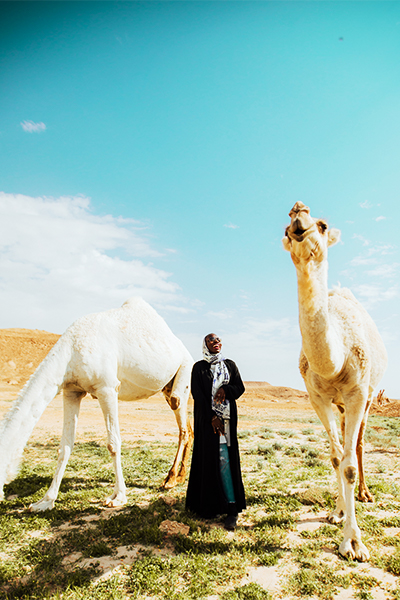
Image: Alex Parker
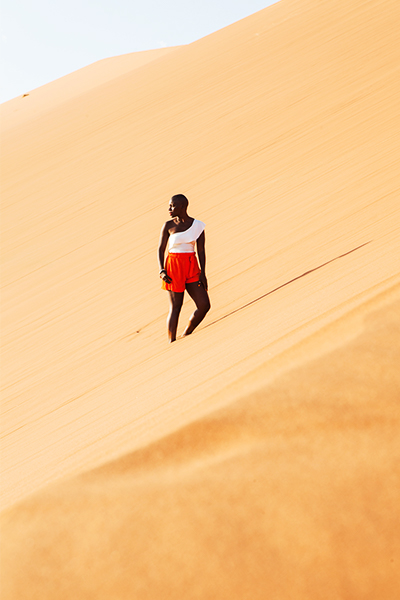
Image: Wes Walker
“In South Sudan, I spent time in a cattle camp,” she says. “There was this guy and I asked him how many heads of cattle I might be worth, and he said, ‘Thirty, at most,’ which isn’t a lot. Then I asked him how many cows he had, and he said, ‘That’s like asking me how much money I have in the bank.’ There were just so many characters in South Sudan – that was one of my favourite trips for sure.”
This is saying something, given that Nabongo – a US-based travel writer, photographer, entrepreneur and “geography nerd” – is credited with being the first woman of African descent to visit every country in the world.
As all-consuming as this quest turned out to be, it essentially started of its own accord. Born and raised in Detroit to Ugandan parents, Nabongo, 38, has been on the move for as long as she can remember. “Growing up, we were always travelling, whether it was a road trip or camping or flying to Uganda,” she says. “I made my first international trip at the age of four. I was exposed to the world at a young age.”
In 2009, Nabongo launched her travel blog The Catch Me If You Can, and in the same year made her first solo trip, to Costa Rica. In 2017, with 60 countries under her belt, she officially set herself the goal of visiting all 195 UN-recognised countries on Earth, which she achieved in late 2019 with a trip to the Seychelles. In the interim, she has slept in a yurt in Kyrgyzstan and a royal suite in Saudi Arabia, eaten reindeer-meat pizza in Finland and received dating advice from a market vendor in Uzbekistan.
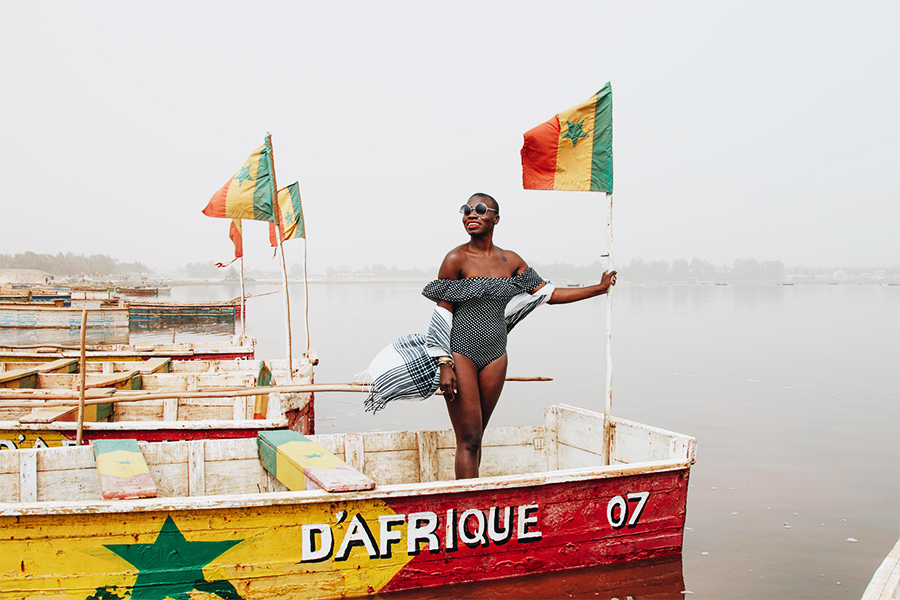
Image: Seyniba

“She didn’t speak English, but she was very insistent and ended up communicating through a variety of gestures,” Nabongo says. “She was trying to tell me that I have to get married soon, because if I don’t I will get old and ugly and no man will ever want me.” When asked what the gesture for ‘old and ugly’ is, Nabongo laughs and says, “Pulling your face down with your hand.”
Returning to the transformative effects of travel, Nabongo believes her journeys have helped her to understand people a little better, improved her storytelling abilities as a writer and liberated her from the stresses of daily life. “I feel lighter when I travel,” she says. “I think it’s because at home there are these obsessions – your career success, what you’re wearing – but in other places no one cares. No one’s thinking, ‘Oh, do those shoes go with that?’ And there’s a lightness to this, a freedom.”
As for how she has mustered the nerve to visit locations that aren’t just last on people’s bucket lists, but are actively avoided, Nabongo again credits her parents’ influence. “Because they raised me with no boundaries, there was never a fear of travel,” she says. “I am not afraid of people; I don’t have a fear of the unknown; I feel confident and comfortable in places where I don’t speak the language. Those are attributes that help me navigate the world in the way that I do.”
A sense of humour, too, is a plus.
Nabongo is brimming with stories about her travels, and she is good at telling them. The obligatory seaside sunsets and hole-in-the-wall feasts are there, but her tales often play out as farce – such as her memories of a Himalayan hike in Bhutan, in which sublime beauty was trumped by sore feet. “We decided to climb up to this Buddhist temple called the Tiger’s Nest,” she says, referring to herself and a local guide. “We were already at 2,000m and the temple was a lot higher. We finally got up there and it was just beautiful, phenomenal, but I was like, ‘Firstly, how the hell did I do this? And secondly, I am so beat.’ My poor guide. I couldn’t stop complaining.”
I am not afraid of people; I don’t have a fear of the unknown; I feel comfortable in places where I don’t speak the language. Those are attributes that help me navigate the world in the way that I do.
Not all of Nabongo’s stories are quite so breezy. She recalls, for instance, a trip to the Israeli-controlled Golan Heights in Syria. “The cab driver who took me there was Palestinian, so I had him translate for me. People were telling stories about how they used megaphones to communicate over the fence. There was a man who didn’t meet his son until the son was 40. I found it strange that my driver, who had been there so many times, had never talked to these people before – he was also hearing these stories for the first time.”
As bleak as this situation may have been, Nabongo relishes experiences that connect her with some kind of truth. “I think that’s what makes the way that I travel different,” she says. “For me, it’s about the human experience.” She has kept in touch with many of the people she’s met on her journeys, she adds – “even the guide from Bhutan”.
Nabongo’s keeping-it-real impulse continues all the way through to mundane details, such as where to go for dinner. “I think if you’re going to travel, you need to stretch yourself,” she says. “I like luxury, but when it comes to food, I want to go where the locals go. I’ve had people take me out to fancy Western restaurants and I have to say, ‘No, I don’t want to see any tourists while I’m eating.’”
Similarly, one of Nabongo’s fondest memories of Ethiopia is of begging her way into a men-only whisky bar in the capital. “Addis is a cool city, very African cosmopolitan,” she says. “But these bars are seedy-looking places. This one was a typical wood-and-cement structure: dim lighting, tiny tables and chairs, very bare bones. But you could appreciate that this is part of a community, a place where men go to talk about home life and work. And this is a sacred place for them, almost. I loved it.”
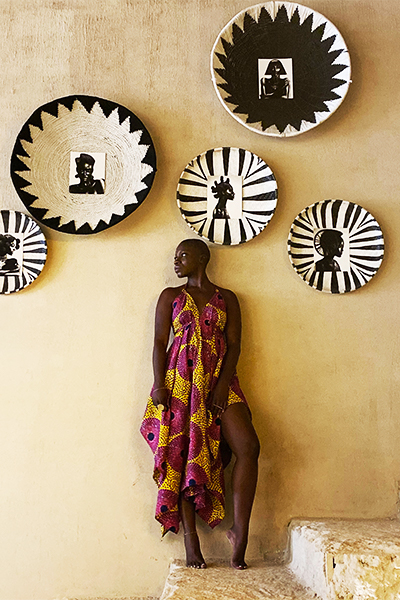
Image: Courtesy of Jessica Nabongo
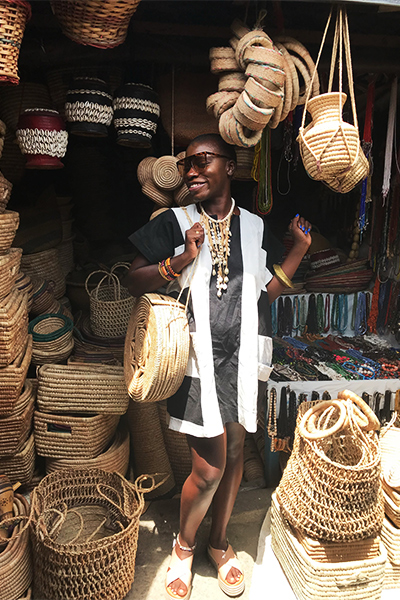
Image: Courtesy of Jessica Nabongo
With such proclivity for telling stories about her travels, it was only natural that Nabongo would end up writing a book. The Catch Me If You Can: One Woman’s Journey to Every Country in the World, which comes out this month (August 2022), is a memoir and travelogue about her global adventure, in which she narrows down her favourite destinations to a, ahem, shortlist of 100 and recounts some of her most remarkable tales.
In general, Nabongo finds herself drawn to Africa. She tends to spend several months a year in various countries on the continent, which has both bolstered and altered her sense of cultural identity. “What’s interesting is that, growing up, I always said I am Ugandan, but now I identify as African.”
Nabongo is mystified that more Africans don’t share her enthusiasm for travel on a continent that, to her mind, has more natural wonders and cultural treasures than any other place on Earth. “I think we have to change our ideas about travel,” she says, referring to a tendency among Africans to opt for holidays in Europe or the US. “You haven’t explored your backyard yet, so let’s start there. The first thing we need to consider is how we value our own continent.”
As for Nabongo, she hasn’t only seen every country in Africa – she’s seen every country, full stop. So where does she go from here? The Moon? Nowhere? Nabongo seems scandalised by the thought. “I’m not going to say, ‘Well, I’ve been to all the countries, that’s it!’” she says. “There are so many places that have changed since I was there. And I’ve changed, too. So you continue to explore, continue making memories. It never ends.”
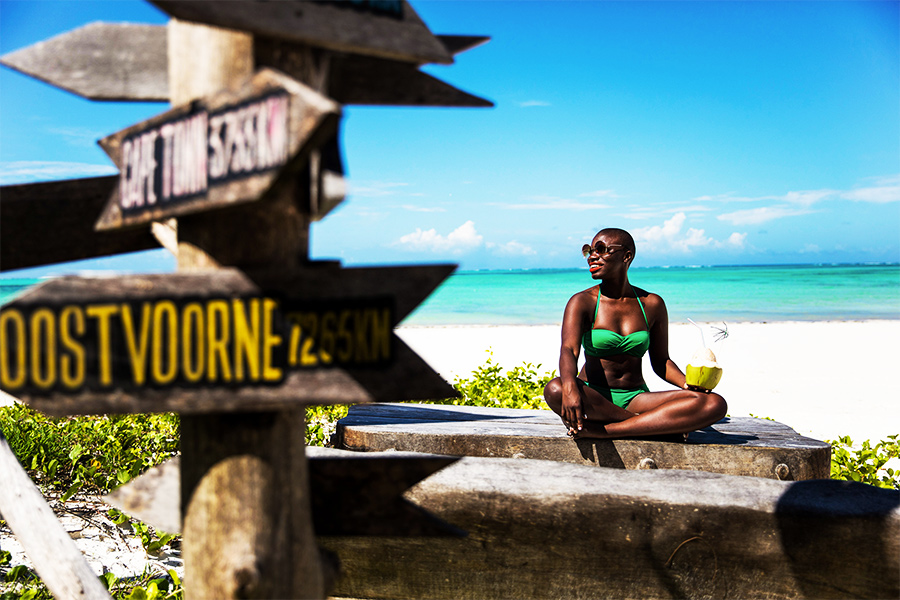
Image: Courtesy of Jessica Nabongo

Accra, Ghana
Accra is a city you will return to over and over. With new restaurants and hotels popping up all the time, you can find new favourites and old staples to sustain you through many trips. Did I mention Accra is great for food, fashion, art and nightlife?
Rural Namibia
Namibia is great for anybody looking for adventure. Take a safari in the incredible Etosha National Park, or visit Sossusvlei, a salt and clay pan surrounded by huge red dunes. I don’t think there is anything like it in the world.
Zanzibar, Tanzania
I have been all over the world and can say that Zanzibar’s features are some of my absolute favourites. The gorgeous and varied coastline, coupled with the laid-back local people, make it the perfect place for rest and relaxation.
Lagos, Nigeria
If you want to see how Africans party, go to Lagos. The city is renowned for amazing fashion and culture, along with the suya-and-Champagne diet that I love. From the NOK by Alara restaurant to Lekki Market to the Nike Art Gallery, there is so much to experience.
Dakar, Senegal
The delicious seafood, extensive coastline, relaxed vibe and to-die-for sunsets have cemented Dakar as one of my favourite African cities. Visit between May and June to explore the Dak’Art Biennale, one of the largest art festivals on the continent.